I frequently get asked for my top recommendations for self-help books in the men’s development and sexuality realm. So I decided to compile a list.
If you don’t want to read through the entire article and read about why I think each book is great, and see some of my favourite quotes from each one, here is the list in it’s entirety to save you time.
– Wild Nights by David Deida
– Fire In The Belly: On Being A Man by Sam Keen
– The Way Of Men by Jack Donavan
– Iron John by Robert Bly
– No More Mr. Nice Guy by Dr. Robert Glover
– The Way Of The Superior Man: A Spiritual Guide to Mastering the Challenges of Women, Work, and Sexual Desire by David Deida
– The Multi-Orgasmic Man: Sexual Secrets Every Man Should Know by Mantak Chia
– The Way Of The Conscious Warrior: A Handbook For 21st Century Men by P.T. Mistlberger
Now, it goes without saying that the books in this list contain a broad spectrum of views/opinions on men, gender roles, spirituality, and sexuality. And while I don’t agree with every line in every book, these are some of the best and most value dense resources that I have come across in my personal inner growth journey.
I will now go through each of these, one by one, briefly say what I love about each title, and include a small handful of quotes from each one that resonated with me the most deeply. Now, book preferences are so personal, and the themes that resonate with me in these books might not be the things that resonate most strongly with you, so I’d recommend checking out a few of the titles if you feel even somewhat compelled by any of them.
Without further ado, here are the eight best books on men’s development, spirituality, and sexuality, that I have discovered in my life thus far.
The 8 Best Books About Men’s Development And Sexuality
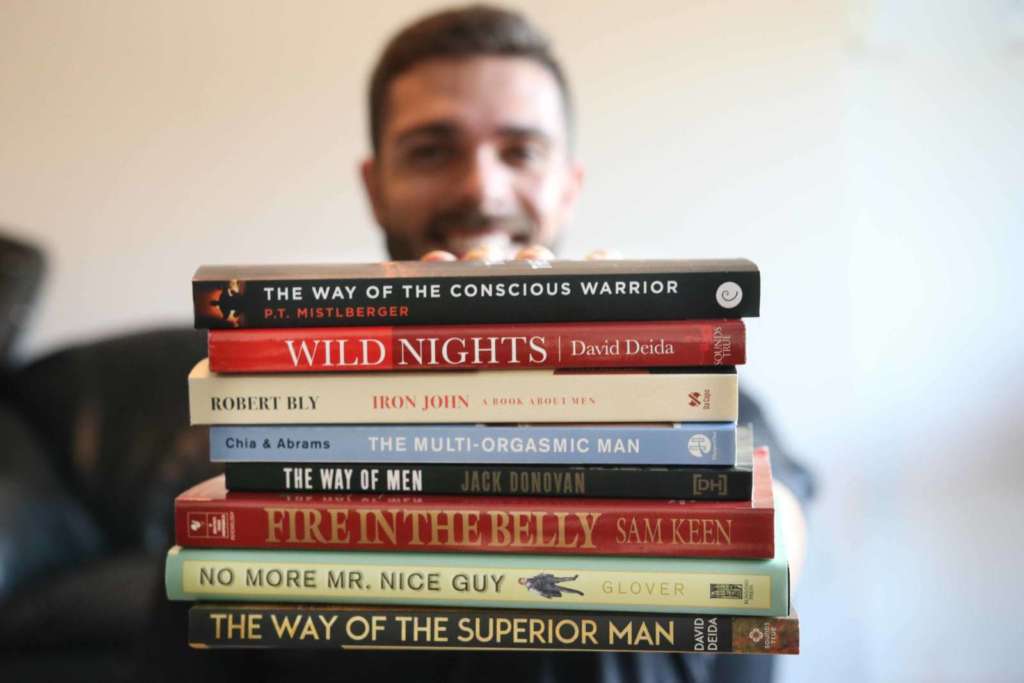
Wild Nights by David Deida![]()
What I like about it:
While this is one of my favourite books in this list, it certainly isn’t for everyone. I tend to recommend this book the most often to my most spiritual/hippie friends because it goes into some really deep themes about love and sex. Either that, or I recommend it most often to my clients who have been raised the most strictly religious, and/or the people who received the most messages about sexuality/sex/masturbation being somehow shameful or wrong, because the book does such a good job of painting the healthy opposite to that framing.
The first time I read this book, I had full body shivers repeatedly. Of all of the books in my physical library, this one has the most yellow highlighter throughout the pages.
Wild Nights is a (possibly semi-autobiographical) book by David Deida about his spiritual path being shaped and directed by a fictional character named Mykonos. Mykonos teaches the young protagonist about how sex is a spiritual practice, and our bodies and hearts are hyper-connected entities.
If you’ve ever struggled with the idea that a developed spiritual practice and sexual pleasure can’t be enjoyed by the same person (in the same lifetime, or in the same moment) then this book will shift a lot of paradigms for you. The story is so well presented and the numerous scenes of orgies, accessing a concept of a higher being through sex, and opening your heart to others in every moment of your life are all eloquently contained within this short read.
This book isn’t for everyone… but for the ones who benefit from it, it will be one of the greatest books you’ve ever read (at least it was for me).
Some of my favourite quotes from Wild Nights:
“You are reduced to weakness if you live in your head, which always expresses doubt and ambiguity.”
“Most people never get beyond trying to own each other’s love in a kind of contractual bondage. (…) When a love relationship becomes a stand-in for utter openness – when you are afraid of losing love – then you bind yourself in clinging, enclosing love in a cult of two, engaging your lover in contracts of fear. When a relationship binds your heart in fear of betrayal, then it isn’t an offering of love, it’s a trap.”
And the final quote, which is just over a page of text in the book, that literally changed my perception of my life forever. I felt like God was speaking into my soul when I first read these words. I had goosebumps throughout this entire chapter, but this passage in particular spoke directly to the centre of my heart.
“Most people spend their entire lives believing that what they see is everything. Until they die. Then it all washes away, and they find themselves in another room, bewildered.
We continued to drink.
“Some people get a little spiritual. They have mystical experiences or whatever, and they begin to step outside of the room. They realize that they were never in a room to begin with, that all the time they thought they were in the room, living their little lives, they were actually outside the room. All along, they were the space outside the room – the deep space of consciousness – but they forgot it, and so they got lost in the goings-on inside the room. They got lost in the drama of their little lives and forgot the immensity of who they really are.”
Mykonos looked outside the window and paused.
“Those people,” he continued, “those spiritual people,” he said, with more than a hint of sarcasm, “they begin to think the room is bad, because it is so brief, so limited. They begin to think that life is bad. And especially, they begin to think that pleasure is bad. Sex is bad. If the room changes after death, if it isn’t eternal, why bother?”
Mykonos paused to drink sake, and then continued.
“Yes, my friend, most people are stuck inside the room, thinking it is all there is, living their lives dedicated to an ever-changing vision that is going to evaporate sooner or later, and so underneath their fake smiles and fragile relationships they are afraid. Or, they are desperately hoping that it is better to get outside the room once and for all, doing their best to get ready to leave the room, meditating their way into emptiness, praying their way to heaven – or whatever – being ‘good’ and ‘spiritual’ so they can leave all of these suffering, sexing bodies behind and get outside the room of changes, and rest in eternal peace.”
Mykonos drank the rest of the sake in his glass, placed the glass down on the table, turned from the window, and looked directly into my eyes.
“I, however, find it far more interesting,” Mykonos said with a smile, “to be both inside the room and outside the room at the same time.”
No More Mr. Nice Guy by Dr. Robert Glover
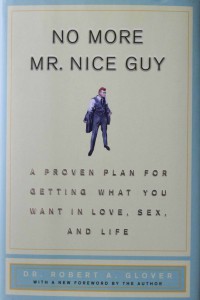
What I like about it:
When my friend Mike first told me about this book, I thought that the title seemed a little bit ridiculous.
Was I about to learn how to be an asshole? Was it a pickup book? Was it a morally questionable book from the men’s movement, gone awry?
The answers, it would turn out, were no, no, and no. If anything, this book is, first and foremost, a how-to guide for any male (especially any male born after 1975) on how to get their needs met, be more personally assertive, gain more confidence and self-esteem, and enjoy greater emotional freedom, fulfillment, and integrity throughout their lives.
I wrote my first ever dedicated book review (for this website) on this book for a reason. And if this book shook me to my core as deeply as it did, and you’ve been following my writing for any length of time, then there’s a good chance that this book will connect with you and how you operate in the world as well (regardless of your age).
No More Mr. Nice Guy lays out, through nine chapters, how to get “what you want in love, sex, and life.”
With chapter headings like, “Make Your Needs A Priority”, “Reclaim Your Personal Power”, and “Learn To Please The Only Person Who Really Matters”, the overall theme of the book emerges fairly quickly.
Ultimately, this book is a step-by-step guide on how to start meeting your own needs.
Some of my favourite quotes from No More Mr. Nice Guy:
“The Nice Guy Syndrome represents a belief that if Nice Guys are “good,” they will be loved, get their needs met, and live a problem-free life. When this life strategy fails to produce the desired results – as it often does – Nice Guys usually just try harder, doing more of the same. Due to the sense of helplessness and resentment inevitably produces, Nice Guys are often anything but nice.”
“In general, people are not drawn to perfection in others. People are drawn to shared interests, shared problems, and an individual’s life energy. Humans connect with humans. Hiding one’s humanity and trying to project an image of perfection makes a person vague, slippery, lifeless, and uninteresting.”
“There are no perfect relationships. There are no perfect partners. Relationships by their very nature are chaotic, eventful, and challenging.”
“Because nice guys tend to be very black and white in their thinking, the only alternative they can see to being nice is becoming “bastards” or “jerks.” I frequently remind Nice Guys that the opposite of crazy is still crazy, so becoming a “jerk” isn’t the answer.”
“By trying to please everyone, Nice Guys often end up pleasing no one — including themselves.”
The Way Of Men by Jack Donovan
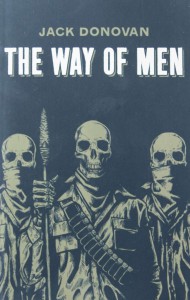
What I like about The Way Of Men:
Jack Donovan presents well thought out points about how the way of men is the way of the gang. That we are the natural enforcers and protectors of boundaries. That without courage, strength, mastery, and honour, we are not much.
If you are a man who is afraid of his own masculine edge, or you are unhealed with your father, I would recommend checking out this book. It’ll either change your life, or trigger the shit out of you. Either way, a valuable experience.
Some of my favourite quotes from The Way Of Men:
“If you are never truly challenged in a meaningful way and are only required to perform idiot-proofed corporate processes to get your meat and shelter, can you ever truly be engaged enough to call yourself alive, let alone a man?”
“Men who don’t care about what the other men think of them aren’t dependable or trustworthy.”
“The goal of civilization seems to be to eliminate work and risk, but the world has changed more than we have. Our bodies crave work and sex, our minds crave risk and conflict.”
“Men of ideas and men of action have much to learn from each other, and the truly great are men of both action and abstraction.”
“Women are more comfortable with accepting the benevolent aid of the group because they have always required it. A healthy adult woman must accept aid from the group if she is to carry a child, give birth and care for an infant. And, especially when men have achieved a level of security and prosperity beyond mere survival, women have been evaluated by men based less on their utility than on their more nebulous qualities like attractiveness and social charm. When they have the means, most men will happily support a woman who seems to be carefree, pretty and charming.
This has not been the case for men. It is far rarer for women or men to volunteer to support a grown, able-bodied man. It is rarer still for them to support him without resentment. There is no point in an adult male’s life when he can be excused from carrying his own weight, except when he is sick, injured, handicapped or old. Human societies accommodate all of these exceptions, but competency has always been crucial to a man’s mental health and sense of his own worth. Men want to carry their own weight, and they should be expected to.”
Fire In The Belly: On Being A Man by Sam Keen
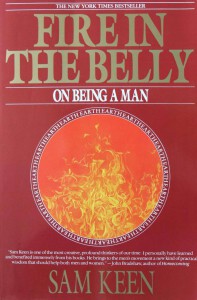
What I like about Fire In The Belly:
Despite being released in the early 1990’s, this book is a potent force, and its core themes hold true to this day.
The overarching contents of the book dive into man’s relationship to women, the initiatory processes of men, warrior psyche, vocation/path/purpose, self-inquiry, the virtues of heroic men, and how to come together with women in an integrated and embodied way.
There were several pages throughout this book that felt so deeply validating of my experience as a man that I cried while reading them. It felt like my parched heart was finally getting the drink of water that it had been craving.
This decades-old tome is worth picking up. No doubt about it.
Some of my favourite quotes from Fire In The Belly:
“There is no easy formula for determining right and wrong livelihood, but it is essential to keep the question alive. To return the sense of dignity and honor to manhood, we have to stop pretending that we can make a living at something that is trivial or destructive and still have sense of legitimate self-worth. A society in which vocation and job are separated for most people gradually creates an economy that is often devoid of spirit, one that frequently fills our pocketbooks at the cost of emptying our souls.”
“Condition a man (or a woman) to value aggression above all other virtues, and you will produce a character type whose most readily expressed emotion will be anger. Condition a woman (or a man) to value submission above all other attitudes and you will produce a character type whose most readily expressed emotion will be sadness.”
“There are two questions a man must ask himself: The first is ‘Where am I going?’ and the second is ‘Who will go with me?’
If you ever get these questions in the wrong order you are in trouble.”
“In the dark night of the soul, we lose our old identities as conquerors and workers. And naturally enough we get impatient. ‘Let’s go on with it. Enough os this wallowing around in the psychic mud of ‘negative emotions.’ After all, we don’t have a lot of experience that suggests that anything of value is happening unless we are in control. Nothing prepared us to cherish fallow time. The right name for manly restlessness and inability to enjoy fallowness is mistrust.”
“As you read this sentence somewhere in the world everything lovely and terrible is happening: Lovers are shuddering in orgasm, babies are being born, men are torturing the innocent, growing flowers, writing poems, burning rain forests, building hospitals, and so on.
If our eyes only fall on what is terrible, we become hypnotized by evil and either turn aside in despair because it is overwhelming, or become fanatical warriors. Focusing on suffering is depressing and debilitating. (…) To get through the world alive we have to care until our hearts break and cram our lives full of enjoyment. Both/and, not either/or. (…) If I were asked to diagnose the spiritual disease of modern men I would not concentrate on symptoms such as our lust for power, our insatiable hunger for gadgets, or our habit of repressing women and the poor. I would, rather, focus on our lack of joy. Most of the men I know are decent, serious, and hard-working. What they are not is juicy, sensual, and fun.”
“When men who have spent their formative years in extroverted action first turn inward toward the unknown territory of the soul, they soon reach the desert – the vast nothingness. Before rebirth comes the painful awareness that we have long been dead. Before feeling comes the dreadful knowledge that we have been anesthetized and are numb.
The popular cliche says that men think and do, women feel and emote. It’s a half-truth worth playing with. Most of us learned that real men were supposed to control their feelings. From childhood onward we heard that ‘men don’t cry.’ We learned to work hard, take a lot of punishment, and not bitch about it. Remember the pride we took in climbing mountains, ignoring the cold, running until we were exhausted, taking hard punches, pushing the limits, driving all night? No pain, no gain. That’s the right stuff.
Little did we understand that by doing the manly thing, girding up our loins, pulling in our guts, pushing out our chests, tightening our jaws, and constricting our breathing, we forced most feelings into exile in our unconscious. It is hard to experience a lot of emotion when the body’s potential for motion is constricted.”
The Way Of The Conscious Warrior by P.T. Mistlberger
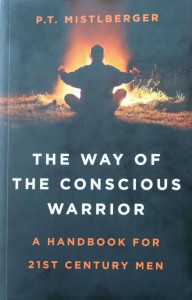
What I like about The Way Of The Conscious Warrior:
The fact is this: courageous, self-aware, integrated men get more out of life. If you are a man who wants to become more confident, accomplished, and whole, this book will help you put your childhood wounding to bed, and help you move forward in life. With chapters regarding shadow figures, maturation, and practical steps for deepening your relationships, The Way Of The Conscious Warrior by P.T. Mistlberger is a potent balm for the modern man. One of the most balanced, eloquent, and deeply practical books I have read regarding men’s work and masculine development. The Way Of The Conscious Warrior is the ultimate resource for any man who wants to engage his life more fully.
It was also written by my personal teacher and mentor of the last 3+ years (and I choose my teachers very carefully, so that’s saying something). Phil is also the founder of the men’s group organization that I have been a part of for the last several years.
Some of my favourite quotes from The Way Of The Conscious Warrior:
“How to develop a ‘healthy masculine core’? There is no magic pill, no overnight process, no accelerated growth program that will bring about the confidence that arises from resting comfortably in one’s masculinity. However, it can be said that a strong and well-balanced masculine core has its foundations in a sense of accomplishment in life. A man who gets in the knack of completing tasks, projects, programs, and in general goals designed to improve his life – and most importantly, does not allow his relationships with romantic partners to seriously slow down his progress or distract him – is a man who gradually feels more and more confident about who he is.
Alongside that is the importance of tribe. A man comfortable in his masculinity does not arise in solitude, the proverbial ‘he came out nowhere’ stereotyped hero of cartoons. A confident man develops among a tribe of elders and brothers, even if such elders and brothers are few. He has relationships with other men, and he chooses to work with them, rather than constantly competing with them, or even worse, avoiding and secretly hating them.”
“A man who has very developed classical masculine traits (strength, bravery, sense of direction, purpose, etc.) but who is disconnected in other ways – say, he’s too emotionally shut down, he’s clued out in interpersonal relating, he lacks empathy and is emotionally tone deaf, and so forth – is not fully masculine. A man truly developed in his masculinity is strong but not threatened by softness; can reason clearly about the big picture but is not deaf to the emotional peculiarities of a given moment; can lead a company or group but is also sensitive to the needs of an individual.”
“A man must learn to truly connect with other men, and in so doing, begin to understand that they are not the enemy. This can take time, naturally, and in the case of ‘worthy enemies’ may seem insurmountable, even over the course of an entire lifetime. A nemesis can be sustained forever. But at what cost? And for what purpose?”
“Many men go the lap-dog route, typically because they desperately fear the loss of their love-attachment, although probably most such men would deny or scoff at such an idea. A fair percentage of men do poorly on their own, ending up choosing the domesticated lap-dog route rather than risk the terrors of a solitary life. Many men are already alone in their heads, so to speak, lacking the fuller social or feeling life of most women, and many fear the prospect of growing fat and old with nothing to be consoled by except for the flat screen TV, porn, and the beer in the fridge. Best put up and shut up, then.”
“All inner work can be reduced to three overarching categories: self-acceptance, empowerment, and self-observation. Engaging the first is the basis of psychotherapy; engaging the second is the basis of all self-expressive forms of work (art, music, ritual/ceremony, martial arts, etc.); engaging the third is the basis of meditation.”
Iron John by Robert Bly
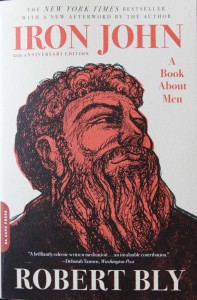
What I like about Iron John:
The thesis of this book is clear: there is a lack of grounded, present, potent father energy in modern times, and the world is suffering as a result. The antidote to this problem, Bly suggests, is for more men to seek out qualified male elders and have them assist them in stepping into their personal power.
For a book that often speaks through poetry and ancient mythology, it’s directives are actually quite clear. I experienced a strong sense of feeling totally seen by this book. The text itself is almost a surrogate father figure (or ‘second King’) to any man who craves it.
Iron John centres around the Grimms’ fairy tale (originally Iron Hans) about a young boy who is introduced to a hairy wild man and progressively initiated into the world of adulthood. I won’t ruin the whole story for you, but this is essentially a book about going from being a naive boy, to finding your edge and integrating all parts of your masculine psyche.
If you feel allergic to the occasional piece of poetry, or aren’t a fan of symbology, this read might not be for you. But for every other man, I would recommend it. It is a well-known classic for a reason.
Some of my favourite quotes from Iron John:
“A boy cannot change into a man without the active intervention of older men.”
“We know that for hundreds of thousands of years men have admired each other, and been admired by women, in particular for their activity. Men and women alike once called on men to pierce the dangerous places, carry handfuls of courage to the waterfalls, dust the tails of the wild boars. All knew that if men did that well the women and children could sleep safely. Now the boars have turned to pigs in the stockyard, and the rushing rivers to the waterfall in the Museum of Modern Art courtyard. The activity men were once loved for is not required.”
“Inside each men or woman there is a sick person and a well person: and one needs to know which one is talking at any moment.”
“In high school a girl might ask, “Do you love me?” I couldn’t answer. If I asked her the same question, she might reply, “Well, I respect you, and I admire you, and I’m fond of you, and I’m even interested in you, but I don’t love you.” Apparently when she looked into her chest, she saw a spectrum of affections, a whole procession of feelings, and she could easily tell them all apart. If I looked down into my chest, I saw nothing at all. I had then either to remain silent or fake it. Some women feel hurt when a man will not “express his feelings,” and they conclude that he is holding back, or “telling them something” by such withholding; but it’s more likely that when such a man asks a question of his chest, he gets no answer at all.”
“When a father and son do spend long hours together, which some fathers and sons still do, we could say that a substance almost like food passes from the older body to the younger. The contemporary mind might want to describe the exchange between father and son as a likening of attitude, a miming, but I think a physical exchange takes place, as if some substance was passing directly to the cells. The son’s body – not his mind – receives and the father gives this food at a level far below consciousness. The son does not receive a hands-on healing, but a body-on healing. His cells receive some knowledge of what an adult masculine body is. The younger body learns at what frequency the masculine body vibrates.”
The Way Of The Superior Man by David Deida
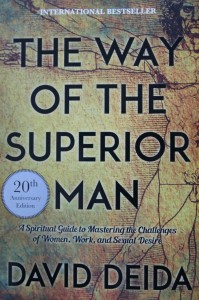
What I like about The Way Of The Superior Man:
It is rare that a list of ‘must-read’ books on men’s spiritual development doesn’t include The Way Of The Superior Man for a reason. As far as modern spiritual wisdom goes, this 200 page, value-dense little beauty is worth it’s weight in gold.
In this book, Deida talks about sexual polarity, aligning with your life’s highest purpose, dealing with women, the masculine dark side, sexual body practices, conscious intimacy, and more.
If you haven’t read it yet, or even if you have and it has been a few years since you last went through it, I would highly recommend picking up a copy. Originally published in 1997, The Way Of The Superior Man is a classic read for men who are on the path, simply, because it deserves to be.
Some of my favourite quotes from The Way Of The Superior Man:
“When a man’s value is no longer measured by what he does, by his finances or social standing, how does he determine his worth? In our new world, a man’s presence – his depth of awareness – is his most valuable asset.”
“Stop waiting. Feel everything. Love achingly. Give impeccably. Let go.”
“A man should live with a hurting heart rather than a closed one.”
“Admit to yourself that if you had to choose one or the other, the perfect intimate relationship or achieving your highest purpose in life, you would choose to succeed at your purpose. Just this self-knowledge often relieves much pressure a man feels to prioritize his relationship when, in fact, it is not his highest priority. Your mission is your priority.”
“If a man is very masculine by nature, then he will be attracted to a very feminine woman, who will complement his energy. The more neutral or balanced he is, the more balanced he will prefer his woman. And, if a man is more feminine by nature, his energy will be complemented by the strong direction and purposiveness of a more masculine woman. By understanding their own needs, men can learn to accept the “whole package” of a woman.”
“A man’s highest purpose is his priority, not his intimacy.”
The Multi-Orgasmic Man by Mantak Chia & Douglas Abrams
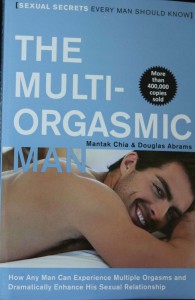
What I like about The Multi-Orgasmic Man:
The very first page of this book promises its reader that they will learn how to become multi-orgasmic, improve their overall health, end premature ejaculation, overcome impotence, and use sexual energy to deepen your spiritual practice. And here’s the thing… if you actually put in the work, all of these claims will come true in your life. It just requires effort.
(Which, as a side note, is exactly what I say in my video course Supercharge Your Sex Life. With 1-2 hours per week of effort, you can have a stronger penis with more reliable erections, last longer than you ever thought possible, and become the partner of her dreams. If you are willing to put in the work, all of these things are easily available to any man.)
While this book definitely has some more woo-woo language that could turn off some readers, there is a lot of potent sexual wisdom that can benefit your life if you’re open to putting in the time.
Some of my favourite quotes from The Multi-Orgasmic Man:
How can you love a woman in your arms if you are busy holding another one in your dreams?
When you ejaculate you should feel refreshed and energetic. If ejaculating leaves you feeling empty, depressed, or exhausted, you need to increase the amount of time between ejaculations.
A man at twenty can ejaculate once every four days.
A man at thirty can ejaculate once every eight days.
A man at forty can ejaculate once every ten days.
A man at fifty can ejaculate once every twenty days.
A man at sixty should no longer ejaculate.
At heart most men are as terrified of women’s infinite sexual capacity as they are fascinated by it. The general effect on men is to make them feel sexually insecure and causes them to attempt to compensate with some other strength. Sexual insecurity may be the primary reason men have sought physical, political, financial, intellectual, and religious advantage over woman.
Most porn movies portray men thrusting in and out, sawing away until they ejaculate. It is no surprise that this is therefore what most men think they should do. In fact, this thrusting rhythm is a recipe for fast ejaculation and little satisfaction for either the man or the woman.
Taoist sexuality was developed as a branch of medicine, not morality. It therefore does not prohibit any form of sexual activity but simply tries to teach people how to stay healthy while engaging in it. The Taoist masters saw masturbation, which they called solo cultivation or genital exercise, as an essential way of developing ejaculatory control and of learning to circulate sexual energy to revitalize the body.
Many people worry about masturbating “too much,” but the Taoists knew that there is no such thing – as long as one learns to control ejaculation. Too much ejaculation is the problem: it drains men of their strength, but this can happen with intercourse as well as self-pleasuring.
Wrap Up And Other Bonus Materials
That list again (in case you didn’t want to scroll up to the top of this post) is:
– Wild Nights by David Deida
– Fire In The Belly: On Being A Man by Sam Keen
– The Way Of Men by Jack Donavan
– Iron John by Robert Bly
– No More Mr. Nice Guy by Dr. Robert Glover
– The Way Of The Superior Man: A Spiritual Guide to Mastering the Challenges of Women, Work, and Sexual Desire by David Deida
– The Multi-Orgasmic Man by Mantak Chia
– The Way Of The Conscious Warrior: A Handbook For 21st Century Men by P.T. Mistlberger
Happy reading!
Dedicated to your success,
Jordan
Ps. If you liked this article, you will also love checking out:
– Supercharge Your Sex Life (video series for men)
– 20 Amazing Books I Have Been Recommending To Everyone Lately
– The 5 Best Books On Cultivating Healthy Intimate Relationships








